| Listing 1 - 10 of 15 | << page >> |
Sort by
|
Book
ISBN: 9782915830972 2915830975 Year: 2015 Publisher: Paris : l'Échappée,
Abstract | Keywords | Export | Availability | Bookmark
 Loading...
Loading...Choose an application
- Reference Manager
- EndNote
- RefWorks (Direct export to RefWorks)
Counterculture --- Contre-culture --- Grogan, Emmett, --- Diggers (San Francisco, Calif.)
Book
ISBN: 9056172964 9789056172961 Year: 2001 Publisher: Leuven Van Halewyck
Abstract | Keywords | Export | Availability | Bookmark
 Loading...
Loading...Choose an application
- Reference Manager
- EndNote
- RefWorks (Direct export to RefWorks)
Dutch literature --- Prostitutie --- Prostitution --- Secke, Jacques --- Fortune hunters --- Secke, Jacky --- Gigolos --- Gold diggers --- Persons
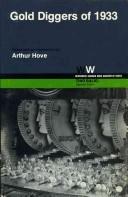
ISBN: 9780299080846 9780299080808 0299080846 0299080803 Year: 1980 Publisher: Madison : Published for the Wisconsin Center for Film and Theater Research by the University of Wisconsin Press,
Abstract | Keywords | Export | Availability | Bookmark
 Loading...
Loading...Choose an application
- Reference Manager
- EndNote
- RefWorks (Direct export to RefWorks)
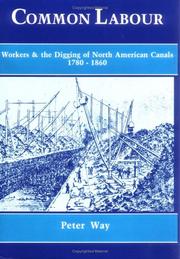
ISBN: 0511583893 051109857X 0521440335 0521102650 Year: 1993 Publisher: Cambridge : Cambridge University Press,
Abstract | Keywords | Export | Availability | Bookmark
 Loading...
Loading...Choose an application
- Reference Manager
- EndNote
- RefWorks (Direct export to RefWorks)
This study of canal construction workers between 1780 and 1860 challenges labour history's focus on skilled craftsmen and the model of working-class culture it generated. Canallers, part of the mass of unskilled labour thrown up by industrial capitalism, had an experience that differed in many ways from artisans. Once on the labour market, they were wholly alienated, more fully exploited, worse off economically and socially fragmented. Their struggle as members of a class pivoted on material conditions not on skill and shop-floor control. Canal construction played a significant role in the rise of industrial capitalism by opening new markets, providing an army of workers and initiating the state-capital ties so important in later years. Increasingly dominated by Irish immigrants the workforce lived in shanty towns at the work site or in nearby cities, the setting for much vice and violence. These were not the vibrant working-class communities of later labour history and the situation deteriorated in the late 1830s as labour surplus caused massive unemployment and depressed wages. The history of canal workers traces another strand of the labour story, one where the absence of skills bred powerlessness that made common labour's engagement with capital markedly unequal.
Canal construction workers --- Canals --- Channels (Hydraulic engineering) --- Hydraulic structures --- Inland navigation --- Canal diggers --- Canal workers --- Construction workers --- History. --- Arts and Humanities --- History
Book
Year: 1973 Publisher: Lille : Service de reproduction des thèses de l'université,
Abstract | Keywords | Export | Availability | Bookmark
 Loading...
Loading...Choose an application
- Reference Manager
- EndNote
- RefWorks (Direct export to RefWorks)
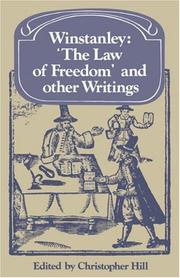
ISBN: 0521252997 0521031605 0511558503 Year: 1983 Publisher: Cambridge Cambridge University Press
Abstract | Keywords | Export | Availability | Bookmark
 Loading...
Loading...Choose an application
- Reference Manager
- EndNote
- RefWorks (Direct export to RefWorks)
Leader of the Diggers, or True Levellers, whose colony was forced to disband in 1650, Gerrard Winstanley stands out from a century remarkable for its development in political thought as one of the most fecund and original of political writers. An acute and penetrating social critic with a passionate sense of justice, he worked out a collectivist theory which strikingly anticipates nineteenth- and twentieth-century socialism. He was the first modern European thinker to write in the vernacular advocating a communist society, and to call upon ordinary people to realize it. Winstanley published a number of pamphlets on the colony's behalf, among them a summary of his ideas, published in 1652 as The Law of Freedom in a Platform and dedicated to Oliver Cromwell. Christopher Hill's selection from Winstanley's many published pamphlets demonstrates the coherence and social relevance of Winstanley's philosophy, while it reveals his mastery of colloquial prose and his superb use of imagery.
Staatkunde --- Winstanley (Gerrard). --- Politique (Philosophie) --- Social Sciences --- Political Science --- Communism --- Levellers --- History --- Sources. --- Great Britain --- Diggers --- Radicals --- Bolshevism --- Communist movements --- Leninism --- Maoism --- Marxism --- Trotskyism --- Collectivism --- Totalitarianism --- Post-communism --- Socialism --- Village communities
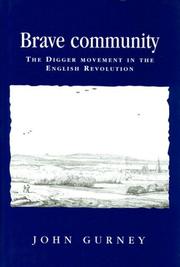
ISBN: 1781700745 1847791433 9781781700747 9781847791436 0719061024 9780719061028 0719061024 9780719061028 Year: 2007 Publisher: Manchester : Manchester University Press,
Abstract | Keywords | Export | Availability | Bookmark
 Loading...
Loading...Choose an application
- Reference Manager
- EndNote
- RefWorks (Direct export to RefWorks)
This is the first full-length, modern study of the Diggers or 'True Levellers', who were among the most remarkable of the radical groups to emerge during the English Revolution of 1640-60. It was in April 1649 that the Diggers, inspired by the teachings and writings of Gerrard Winstanley, began their occupation of waste land at St George's Hill in Surrey and called on all poor people to join them or follow their example. Acting at a time of unparalleled political change and heightened millenarian expectation, the Diggers believed that the establishment of an egalitarian, property-less society
Levellers. --- Winstanley, Gerrard, --- Cobham (Kent, England) --- England --- Great Britain --- History --- Social conditions --- Politics and government --- Cobham. --- Digger movement. --- Diggers. --- English Revolution. --- Gerrard Winstanley. --- Surrey. --- True Levellers. --- civil war. --- political change. --- property-less society. --- radical groups.
Book
ISBN: 9782915830835 2915830185 2915830835 Year: 2009 Publisher: Montreuil: L'échappée,
Abstract | Keywords | Export | Availability | Bookmark
 Loading...
Loading...Choose an application
- Reference Manager
- EndNote
- RefWorks (Direct export to RefWorks)
"Everything is free, do your own thing." Automne 1966, c'est avec ce mot d'ordre que les Diggers, un petit groupe de jeunes révoltés issus du théâtre, cherchent à radicaliser les enfants-fleurs en train de converger vers San Francisco. Référence faite aux paysans anglais du XVIIe siècle menés par Gerrard Winstanley qui s'étaient approprié des terres seigneuriales pour les cultiver en commun, les Diggers de San Francisco s'emparent du quartier de Haight Ashbury et y cultivent les graines d'une utopie en acte. Partisans du "théâtre guérilla", ils mettent en scène leur rêve d'une vie Libre et Gratuite, distribuent des repas, ouvrent des magasins gratuits, organisent de gigantesques fêtes..., et réclament la rue comme théâtre de leurs actions politiques critiques, subversives et festives. Entrés dans la légende de la contre-culture avec le flamboyant roman autobiographique d'Emmett Grogan, Ringolevio, les Diggers ont traversé les années 1960 comme un de ces "orgasmes de l'histoire", aussi intense que court, et pour lequel il est autant question de révolution que de plaisir... L' "aventure Hippie" a imprimé intensément l'existence de ceux qui l'ont vécue. L'intention du documentaire, réalisé en 1998, était d'enregistrer et (re)diffuser l'énergie qui trente ans après surgissait encore des histoires racontées par ceux que Céline D. et moi avions rencontrés pour faire le film. Dix ans plus tard, loin de l'impression des rencontres, ce livre qui accompagne le film aujourd'hui veut lui servir de postace : livrer plus de détails et récits biographiques, étayer les repères historiques, rendre plus lisible la parabole des Diggers. Les années 60, comme toute période révolutionnaire, connaissent plusieurs commencements et tant de fins, fourmillent de particuliers, s'éparpillent en possibles. Ce livre est donc une version parmi d'autres de cette page d'histoire contemporaine vue par le prisme très singulier des Diggers de San Francisco (note de l'auteur, Alice Gaillard, co-auteur du film "Les Diggers de San Francisco", pour lequel elle a rencontré la plupart des membres du groupe).
Counterculture --- Street theater --- Theater --- Popular music --- Hippies --- Communal living --- Contre-culture --- Théâtre de rue --- Théâtre --- Musique populaire --- Communes (Contre-culture) --- History --- Political aspects --- Histoire --- Aspect politique --- Diggers (San Francisco, Calif.) --- Haight-Ashbury (San Francisco, Calif.) --- San Francisco (Calif.) --- Social conditions --- Conditions sociales --- Activisme --- Performance, art
Book
ISBN: 1283411822 9786613411822 1908493291 9781908493293 9781908493286 1908493283 9781904955719 1904955711 Year: 2011 Publisher: [England] : Andrews UK,
Abstract | Keywords | Export | Availability | Bookmark
 Loading...
Loading...Choose an application
- Reference Manager
- EndNote
- RefWorks (Direct export to RefWorks)
The two decades after Waterloo marked the great age of foreign fortune hunters in England. Each year brought a new influx of impecunious Continental noblemen to the world's richest country, and the more brides they carried off, the more alarmed society became.The most colourful of these men was Prince Hermann von Pückler-Muskau (1785-1871), remembered today as Germany's finest landscape gardener. In the mid-1820's, however, his efforts to turn his estate into a magnificent park came close t...
Fortune hunters --- Gigolos --- Gold diggers --- Persons --- Pückler-Muskau, Hermann, --- Author of Briefe eines Verstorbenen, --- Briefe eines Verstorbenen, Author of, --- Homogalakto, --- Muskau, Hermann Pückler-, --- Pückler, Hermann, --- Pückler, Hermann Ludwig Heinrich, --- Pückler-Muskau, Hermann Ludwig Heinrich, --- Semilasso, --- Von Pückler-Muskau, Hermann, --- بوكلير موسكاو --- Great Britain --- History --- Intellectual life --- Foreign relations --- German prince,
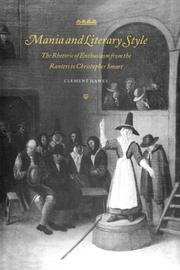
ISBN: 051155348X 1139085654 052155022X 0521022029 0511835345 Year: 1996 Publisher: Cambridge : Cambridge University Press,
Abstract | Keywords | Export | Availability | Bookmark
 Loading...
Loading...Choose an application
- Reference Manager
- EndNote
- RefWorks (Direct export to RefWorks)
This highly original study of the 'manic style' in enthusiastic writing of the seventeenth and eighteenth centuries identifies a literary tradition and line of influence running from the radical visionary and prophetic writing of the Ranters and their fellow enthusiasts to the work of Jonathan Swift and Christopher Smart. Clement Hawes offers a counterweight to recent work which has addressed the subject of literature and madness from the viewpoint of contemporary psychological medicine, putting forward instead a stylistic and rhetorical analysis. He argues that the writings of dissident 'enthusiastic' groups are based in social antagonisms; and his account of the dominant culture's ridicule of enthusiastic writing (an attitude which persists in twentieth-century literary history and criticism) provides a powerful and daring critique of pervasive assumptions about madness and sanity in literature.
English literature --- Enthusiasm in literature. --- Literature and mental illness --- Literature and society --- English language --- Levellers. --- Ranters. --- Antinomianism --- Diggers --- Radicals --- Authors, Insane --- Mental illness and literature --- Poets, Insane --- History and criticism. --- History --- Rhetoric. --- Style. --- Smart, Christopher, --- Arts and Humanities --- Literature --- Germanic languages
| Listing 1 - 10 of 15 | << page >> |
Sort by
|

 Search
Search Feedback
Feedback About UniCat
About UniCat  Help
Help News
News